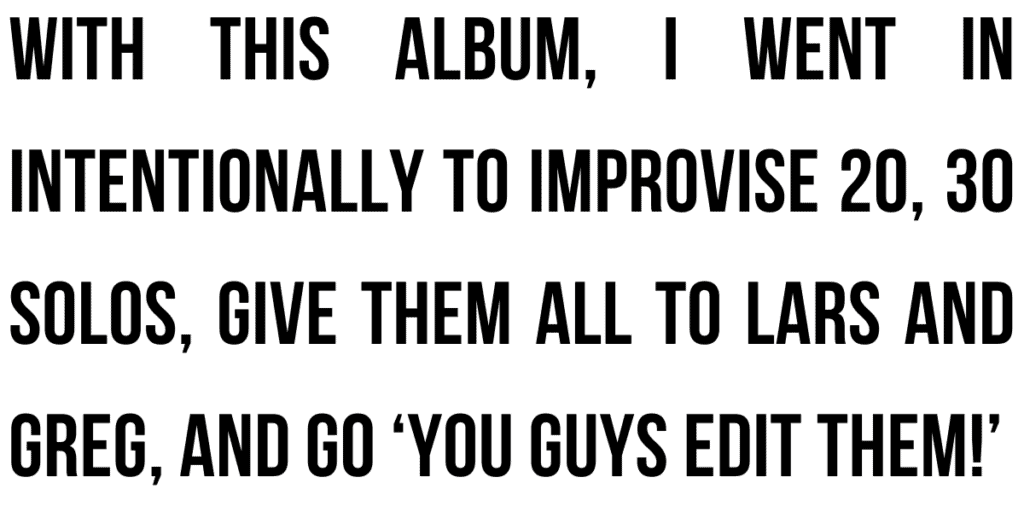While recently chatting with Total Guitar, Metallica lead guitar player Kirk Hammett explained how he came up with solos for the band’s newest album “72 Seasons.” As you may know, if you’ve been following the situation closely, plenty of fans addressed Kirk’s lead parts, some even calling them outright “lazy” efforts. But what he said in the interview might explain why that happened. He pretty much recorded “20, 30 solos” and just gave them up for editing.
While discussing this unconventional creative choice, Kirk pointed out that it was all about his will to improvise solos live. He explained:
“I have every intention on playing every solo from this album differently when we play live. If you watch old videos of Ritchie Blackmore, Jeff Beck, or even Michael Schenker, they’re not playing the solos on the album – they’re playing whatever the fuck they wanna play. I love that because it’s a moment of real honesty.“

“With this album, I went in intentionally to improvise 20, 30 solos, give them all to Lars [Ulrich] and Greg [Greg Fidelman], and go ‘You guys edit them!’ I know I’m gonna play something completely different live, so I can offer something different every time you see Metallica. When you buy a ticket to a Metallica show, you’re not gonna hear carbon copy versions of the album.“
“At a time when it’s just so accessible to see videos of your favourite band, there needs to be some sort of impetus for people to go out and see live shows that are actually somewhat spontaneous. That’s my thing these days – and if people don’t like it, that’s just tough!”
Elsewhere during the chat, he pointed out the importance of having more substance and enjoyable melody over just straight-up shredding. As he explained:
“I don’t try to reach outside the boundaries of the song. I don’t think that’s appropriate. I could string together six or seven three-octave arpeggios, sit there every day and practice it and go, ‘Hey, look what I can do!’ But where am I gonna put it?”
“Arpeggios mapped out like a lot of people do, four or five chords with a different arpeggio over each one? Come on, it sounds like an exercise. I don’t want to listen to exercises and warm-ups. The only guys who I think play arpeggios as a means of expression are Joe Satriani, Yngwie Malmsteen, and Paul Gilbert.”
He also added that he’s very capable of doing wild modal stuff but opted not to do that, explaining:
“I could fill up these songs with a bunch of really fast modal playing. I know my modes, Hungarian scales, symmetrical scales, whole tone scales, I know all that shit. Is it appropriate? Diminished runs – is that appropriate? Maybe earlier in our time, but not now.“
“What’s more appropriate is coming up with melodies that are more like vocal melodies. And guess what? The best scale for mimicking vocal melodies is the pentatonic. There’s a reason why the blues is so expressive, and it’s because of pentatonics. I prefer pentatonics because they’re more expressive.“
“It’s actually harder to say stuff with pentatonics because you don’t have that many notes. It’s easier to play modal, because you’ve got so many notes. Okay, some of them are repeated in different octaves, but I will challenge anyone on that. One, two, three, five notes – what’s more difficult? You tell me.”
While Kirk’s arguments here absolutely make sense, some have pointed out that it’s not the lack of overly technical parts that are wrong with his work on the new album. YouTuber Bradley Hall got the most attention from it, especially by sharing his alternate version of the solo for the album’s lead single “Lux Æterna.”
Judging by some of Kirks statements in interviews, it seemed that Bradley got Metallica guitarist’s attention. After Hammett used pretty much the same “feelings over shred” argument while reflecting on some of the critiques, Bradley then said:
“On paper, he’s absolutely right. But this is reliant on the player in question being competent enough to be able to pull it off. Just because you use the pentatonic scale does not mean automatically that your solos will be your vocal-like. No, not at all.”
“This all comes down to how good you are at phrasing. It’s really just down to that.”
He also added:
“These are not memorable phrases. This just sounds like somebody going through the motions and just playing something off the top of their head and not really being bothered to go back and refine it.”
“And there’s nothing here that’s particularly memorable that will still in your head long after listening to the songs. I’m sorry but it’s just the truth. Just because you went down the route of playing something more raw and improvised. It’s just the truth.”
“Just because you went down the route of playing something more and improvised, it doesn’t mean that you have this right now to be all like high and mighty. Fair enough if the level of improvisation was good and phrasing was really nice. But it’s not. It just sounds like super regurgitated boring lazy phrasing.”
“There are plenty of examples in Metallica’s early work where Kirk… All he’s doing is using the pentatonic scale, or maybe some very, very basic modal stuff as well, but the solos are so memorable.”
“I mean, look at the ‘Enter Sandman’ solo. That’s pretty much just like 90 percent pentatonic wankery but it’s so well phrased that anybody can sing that solo. It’s legendary.”
“So he has to understand, just because he’s taking this holier-than-thou approach of like ‘I’m just gonna stick to the pentatonic scale and play everything raw and improvised off the top of my head’… That doesn’t make it good or means that it necessarily suits the song. It just sounds like excuses for lazy ass playing.”


